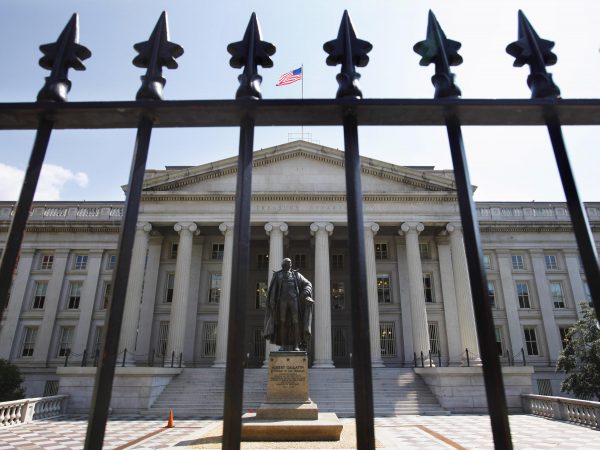
- Details
- By Levi Rickert
WASHINGTON — After five tribal consultation sessions with tribes held this spring, the Treasury Department on Monday released its plan to distribute $20 billion to tribal nations from the Coronavirus State and Local Fiscal Recovery Funds program authorized by the American Rescue Plan Act.
The Act was allocated by Congress and signed into law by President Biden. The tribal distribution plan was sent in a letter to tribal leaders, who were given an opportunity to participate in a video call on Monday afternoon.
According to the letter, the Treasury Department requires all tribal governments to submit a request for funding through an online portal no later than May 24, in order to receive its share of $1 billion that will be allocated equally among the tribes. After a tribe’s submission is received, it will take approximately four to five days for the Treasury Department to review and process.
For the remaining $19 billion, 65 percent or $12.35 billion of the Treasury’s allocation will be based on self-certified tribal enrollment numbers that were submitted to the Bureau of Indian Affairs in April 2021.
The remaining 35 percent, or $6.65 billion, will be distributed to tribes based on tribal employment data. Tribes will have until June 7, 2021 to confirm or amend employment numbers. In mid-June the Treasury will inform tribes of their portion of funding and the anticipated date to receive it.
The Treasury Department’s plan was met with gratitude from tribal leaders.
“Anyone who knows me knows, I am never 100 percent pleased. But I am very pleased with today’s announcement. I always remind myself to not let the perfect be the enemy of the good. But I admit it is most of what I have asked for,” Sault Ste. Marie Tribe Chairperson Aaron Payment said during Monday afternoon’s listening session.
In an email to Native News Online, Payment said he was grateful that the Treasury Department did not treat tribes differently than states with respect to expenditure restrictions.
Payment said he was also thankful this administration did not use the IHBG (housing) guidelines used by the Trump administration last year when it distributed CARES Act funds to tribes, which resulted in two dozen tribes suing the federal government.
“The self-certification of tribal enrollment rather than the IHBG statistic is a threshold moment in American Indian history,” Payment said.
Navajo Nation President Jonathan Nez was also pleased with the tribal enrollment criterion in the Treasury’s distribution plan because the Navajo Nation saw an increase in enrollment numbers last year.
“Thanks to the hard work of the Office of the Controller, our enrollment numbers increased substantially and our office submitted that information to be used to determine funding for the Navajo Nation,” Nez said in a statement released Monday afternoon.
“The weather has changed,” Shawnee Tribe Chairman Ben Barnes said during the listening session. “We’re not sitting in the dark this year.”
The Shawnee Tribe is one of several tribes that still has a lawsuit pending because they claim they were shortened millions of dollars because of how the Trump administration distributed the CARES Act funds last year.
Treasury provided a Coronavirus State and Local Fiscal Recovery Funds Tribal Government Checklist to assist Tribes in completing the necessary steps to receive payments under the program.
In addition, on May 13, 2021 from 3:30 p.m.—5 p.m. ET, Treasury will host a Coronavirus State and Local Fiscal Recovery Funds information session for tribal governments to provide an overview of the program, review all relevant materials, demonstrate the Treasury Submission Portal, and answer questions.
Register here for the information session.
More Stories Like This
Native News Weekly (August 25, 2024): D.C. BriefsUS Presidents in Their Own Words Concerning American Indians
This Day in History — Dec. 29, 1890: Hundreds of Lakota Killed During the Wounded Knee Massacre
Monday Morning (December 29, 2025): Articles You May Have Missed This Past Weekend
Native News Weekly (December 28, 2025): D.C. Briefs
Help us defend tribal sovereignty.
At Native News Online, our mission is rooted in telling the stories that strengthen sovereignty and uplift Indigenous voices — not just at year’s end, but every single day.
Because of your generosity last year, we were able to keep our reporters on the ground in tribal communities, at national gatherings and in the halls of Congress — covering the issues that matter most to Indian Country: sovereignty, culture, education, health and economic opportunity.
That support sustained us through a tough year in 2025. Now, as we look to the year ahead, we need your help right now to ensure warrior journalism remains strong — reporting that defends tribal sovereignty, amplifies Native truth, and holds power accountable.
 The stakes couldn't be higher. Your support keeps Native voices heard, Native stories told and Native sovereignty defended.
The stakes couldn't be higher. Your support keeps Native voices heard, Native stories told and Native sovereignty defended.
Stand with Warrior Journalism today.
Levi Rickert (Potawatomi), Editor & Publisher

